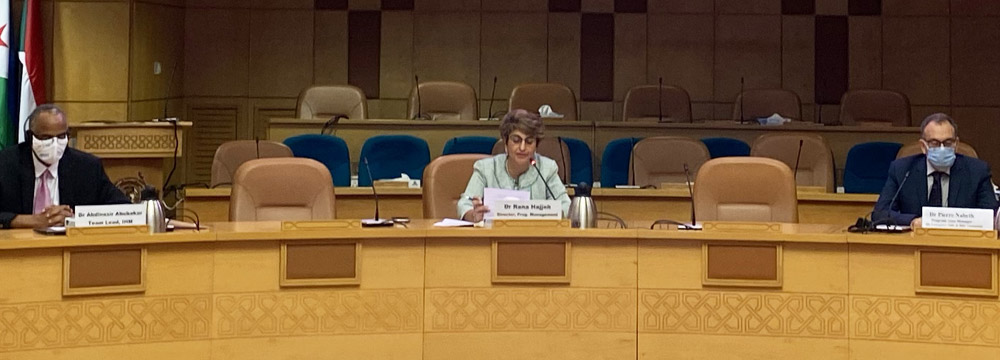
29 October 2020 – Statement for the WHO media briefing by Dr Rana Hajjeh, Director, Programme Management, WHO Regional Office for the Eastern Mediterranean
Dear colleagues,
The COVID-19 pandemic in the Eastern Mediterranean Region has reached an alarming juncture. The highest weekly number of cases since the beginning of the pandemic was reported in the week of 18‒24 October.
As of 27 October 2020, there are about 3 million confirmed cases in the Region and the number of COVID-19 associated deaths exceeds 75 000 with an overall death rate of 2.5%.
Case numbers are expected to grow at an increasing rate during the winter season.
With the continuing presence of the COVID-19 pandemic and concerns that influenza infections may increase the burden on health care systems, it is important to take the seasonal influenza vaccine. WHO recommends that health care workers and older adults be given top priority for the vaccine this year.
In the meantime, efforts to finalize development of vaccines against COVID-19 are continuing. Ten vaccine candidates for COVID-19 are at final stages of Phase III trials. WHO expects that studies on some of those vaccines will be finalized before the end of the year and a limited supply of such vaccines could be available for priority groups early next year. However, we expect it to take a few more months before vaccines become available for use at larger population level.
As for treatment, the interim report of WHO solidarity trials on treatment options for COVID-19 was published recently. The WHO Regional Office is grateful for the active participation of five countries of the Region in these important global trials. The preliminary results demonstrated that there is still no specific treatment for COVID-19 patients. So far, only corticosteroids and oxygen supplementation have proven effective against severe and critical COVID-19. Anti-thrombosis drugs have also been shown to be effective to treat blood clots, which are often reported in seriously ill COVID-19 patients.
Our first and foremost line of defense in the battle against COVID-19 remains preventive public health and social measures. We urge everyone to make wearing a mask a normal part of being around other people, to maintain physical distancing, and to adhere to hand and respiratory hygiene at all times.
Countries of our Region have taken steps to help students return to school after a long period of closures. The continuity of education is critical for children’s learning, development, well-being, health and safety. Furthermore, school closures could adversely affect children’s ability to learn and parents’ ability to work, both of which could in turn introduce other risks. While WHO strongly recommends returning to school, we emphasize that information and clear messages on preventing COVID-19 and limiting its spread in schools should be provided to students, teachers, staff and parents.
Despite the resurgence of cases in some countries in the Region, we still have an opportunity to turn the tide through targeted strategies to control the spread of the virus. Lessons can be learned from those countries that have managed to keep their case and death numbers low while avoiding national lockdowns or restrictions.
As we enter the winter season, we reiterate that seasonal influenza vaccine is one of the best tools against seasonal flu, and high-risk groups should be given priority.
WHO still recommends that countries in the Region implement proven response activities and resist complacency and fatigue, maintain aggressive testing, isolate positive cases, and trace and quarantine their contacts. We appeal to our health and media partners to help us disseminate accurate information, counter rumors and promote physical distancing, wearing face masks, hand washing and other important public health measures.
Together, we can beat COVID-19.
Stay safe!




